|
|
|
Sort Order |
|
|
|
Items / Page
|
|
|
|
|
|
|
| Srl | Item |
| 1 |
ID:
114970
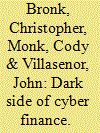

|
|
|
|
|
| Publication |
2012.
|
| Summary/Abstract |
Today information can be exchanged among billions of computers, mobile phones, tablets and other devices connected through the Internet or other networks, wirelessly or physically. There are robust online markets in virtual goods, sometimes paid for using virtual currencies. Computers across the globe can be used collectively to store information in a distributed way so that the information is, in a sense, both nowhere and everywhere at the same time. Encrypted data that convey or unlock value can move thousands of miles in milliseconds. All of this flexibility is being used to design new ways to move money.
|
|
|
|
|
|
|
|
|
|
|
|
|
|
|
|
| 2 |
ID:
162186


|
|
|
| 3 |
ID:
139915
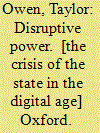

|
|
|
|
|
| Publication |
Oxford, Oxford University Press, 2015.
|
| Description |
x, 248p.Hbk
|
| Standard Number |
9780199363865
|
|
|
|
|
|
|
|
|
|
|
|
Copies: C:1/I:0,R:0,Q:0
Circulation
| Accession# | Call# | Current Location | Status | Policy | Location |
| 058270 | 327/OWE 058270 | Main | On Shelf | General | |
|
|
|
|
| 4 |
ID:
188859


|
|
|
|
|
| Summary/Abstract |
This article reflects on the use of narrative interviews alongside participatory and remote-access visual methods to produce knowledge on and in conflict-affected settings. It details our iterative and reactive experiences of navigating transnational academic, policy and humanitarian networks to attempt to undertake ethical research on the security experiences of displaced people in Somali cities and facilitate their engagement with policymakers. We explore tensions in the combined use of increasingly accessible digital tools (camera-equipped smartphones and open-access satellite imagery) in facilitating a participatory, narrative-based approach to security research while also mitigating access limitations to research sites. We argue that a holistic and reflexive approach to everyday security within a technologically mediated data-collection process – for both researchers and research participants – not only is important for negotiations around ethical fieldwork, but also can be generative of findings about the research site itself. Methods are not brought into a context and deployed by researchers in ways that are fully under their control. In the case explored here, how the researchers and research participants engaged in dialogue about various methods, reflected their connections within networks of knowledge production dominated by humanitarian donors/partners, while also highlighting important aspects of displaced people’s everyday experiences of (in)security and marginalization in Somali cities.
|
|
|
|
|
|
|
|
|
|
|
|
|
|
|
|
| 5 |
ID:
090887


|
|
|
|
|
| Publication |
2009.
|
| Summary/Abstract |
The Commonwealth and the University of Cambridge share values and challenges in the 21st century. The world has changed rapidly and old polarities are no longer relevant. A 'globalising world' is better described as a 'compacting world'. The environment, the role of technology and non-state actors pose major challenges and opportunities. The Commonwealth is by nature ideally suited to be a 'tipping point organisation' in this world, especially in regard to youth, women and the girl child, issues of respect and understanding, order and disorder.
|
|
|
|
|
|
|
|
|
|
|
|
|
|
|
|
| 6 |
ID:
158874


|
|
|
|
|
| Summary/Abstract |
By many standard measures, globalization is in retreat [1]. The 2008 financial crisis and the ensuing recession brought an end to three decades of rapid growth in the trade of goods and services. Cross-border financial flows have fallen by two-thirds. In many countries that have traditionally championed globalization, including the United States and the United Kingdom, the political conversation about trade has shifted from a focus on economic benefits to concerns about job loss, dislocation, deindustrialization, and inequality [2]. A once solid consensus that trade is a win-win proposition has given way to zero-sum thinking and calls for higher barriers. Since November 2008, according to the research group Global Trade Alert, the G-20 countries have implemented more than 6,600 protectionist measures.
|
|
|
|
|
|
|
|
|
|
|
|
|
|
|
|
| 7 |
ID:
150174
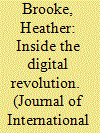

|
|
|
| 8 |
ID:
175171
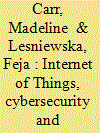

|
|
|
|
|
| Summary/Abstract |
The implementation of the Internet of Things (IoT) is central to what the World Economic Forum has coined the ‘Fourth Industrial Revolution’; a technological revolution built upon cyber-physical systems that will blur the lines between the physical, digital and biological spheres. Novel interconnections will emerge as a result, challenging traditional relations and modes of governance. However, a central feature of the IoT is that the implications of cyber (in)security are no longer abstract. The IoT also returns us to the world of kinetic effects in international relations; more familiar territory for IR. The resulting cooperation and coordination challenges are transboundary in nature, occur at multiple levels across sectors, between institutions, and will impact all actors, both public and private, in complex, often highly politicised ways. In this article we argue that advances in global climate governance appear to be offering an early model of a consensual rules-based approach within the existing international order that provides space for advancing agility, flexibility, and polycentrism to meet the demands of ‘wicked problems’ like the cybersecurity of the IoT. Perhaps one of the most important lessons to be drawn across from climate governance is the role of robust mechanisms for knowledge exchange – specifically between the technical and policy communities.
|
|
|
|
|
|
|
|
|
|
|
|
|
|
|
|
| 9 |
ID:
176068


|
|
|
|
|
| Summary/Abstract |
The regulation of digital technology is gaining increased attention within policy making circles. With growing recognition of the power held by digital media companies and the need to enforce democratic values online, policy makers are reviewing opportunities for oversight. Introducing a special section looking at the regulation of digital election campaigning, this article reviews the case for regulatory reform, the proposed type of regulatory change, and the practice of regulatory innovation. Noting the pace of digital change, it argues that there is a need to think more extensively about the design of any regulatory response in order to prevent systems of oversight becoming obsolete.
|
|
|
|
|
|
|
|
|
|
|
|
|
|
|
|
| 10 |
ID:
193132
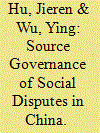

|
|
|
|
|
| Summary/Abstract |
This article examines the features and limits of a new dispute resolution mechanism implemented by Chinese courts called, “Source Governance of Social Disputes” (SGSD). Differing from existing extralegal means of dispute resolution, SGSD aims to bring courts back to the center of dispute resolution by pre-emptively intervening in dispute-prone processes via technology-based mechanisms. However, this has generated two pitfalls. Although preemptive repression can be adopted by deploying digital technologies to impose mediation on people and persuade them to make compromises, such technological deployment by and large fails to resolve the root causes of social disputes. Additionally, SGSD introduces new risks of technological abuse which may coerce litigants to accept mediation instead of adjudication, causing an erosion of public confidence in the Chinese legal system and a weakening of regime legitimacy.
|
|
|
|
|
|
|
|
|
|
|
|
|
|
|
|
|
|
|
|
|